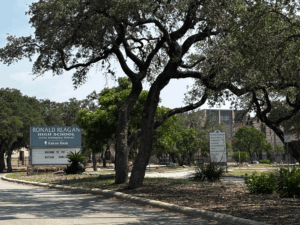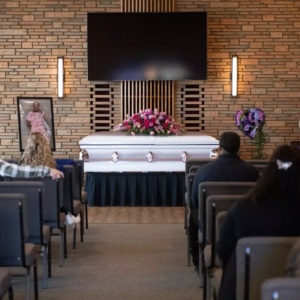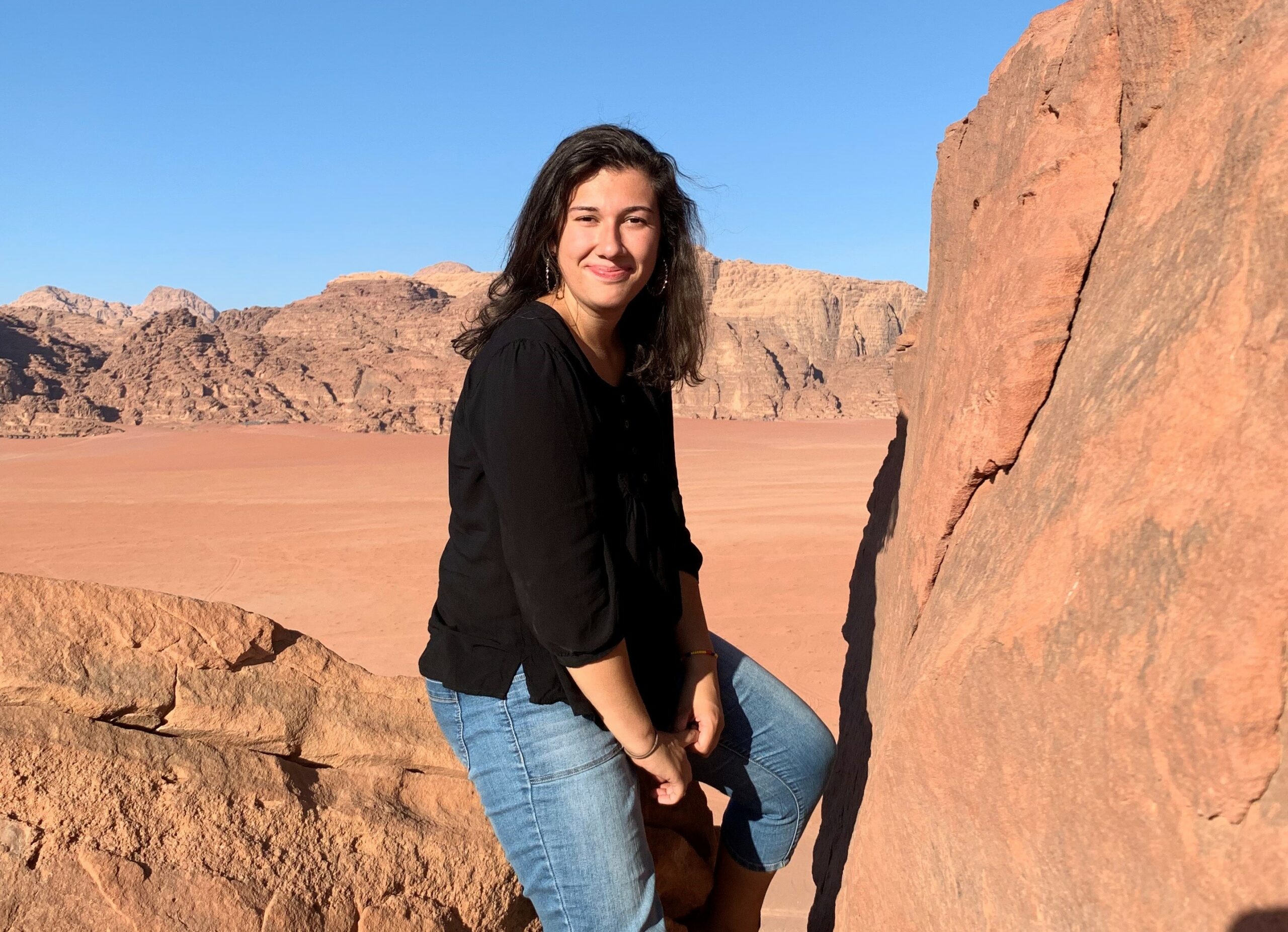
Michelle Rivera joins Rosalynn Carter Fellowships as senior program associate
By Sophia Rhoades and Matt Semon
Carter Center Mental Health Program Interns
The Covid-19 pandemic has transformed the way the world functions and has impacted the lives of everyone across the globe, exposing gaps in governmental and economic systems.
For Michelle Rivera, the strain was particularly evident in the community of immigrant women in Atlanta, her hometown, when she returned to finish her graduate degree from New York University.
Rivera was moved to change her thesis to study the effects of the Covid-19 pandemic on migrant women in the Atlanta metro, and created a tool to connect migrant women with mental health resources.
Rivera went on to embark on a job search centered around humanitarian work.
She previously worked for non-governmental organizations and outreach programs, including the Institute for Healing of Memories North America, the Washington Area Community Fund and Unconventional International, before joining The Carter Center’s Mental Health Program as senior program associate for the Rosalynn Carter Fellowships for Mental Health Journalism.
The following interview with Rivera has been lightly edited and condensed for clarity.
Can you tell us a bit about your work before you joined the Rosalynn Carter Fellowships for Mental Health Journalism?
My background is in mental health and international relations. I have a B.Sc. in counseling psychology from Toccoa Falls College and a master’s degree in peacebuilding and gender studies from New York University’s Center for Global Affairs.
I worked in New York City as a residential caseworker for students in foster care for two years, so that’s where my passion was born and where I saw the need for reliable mental health care. I felt that my career path was not to be a clinician, but I still wanted a career focused on people.
While I was in graduate school, I traveled to Amman, Jordan with World Vision and worked on their communications team, helping to report on what was happening on the ground. I worked in refugee camps, assisted the project managers and grant writing team.
I also traveled to Colombia to interview farmers who were building peace in their communities, and that was also something I really loved.
After I graduated, I supported a start-up, Unconventional International, which works with young women building peace and justice around the world. I spearheaded their monitoring and evaluation and worked with the leadership team and participants on programming.
Last spring, I interned at the International Labor Organization at the United Nations where I coordinated high-level meetings and connected partners.
What projects have you worked on in the past that meant the most to you?
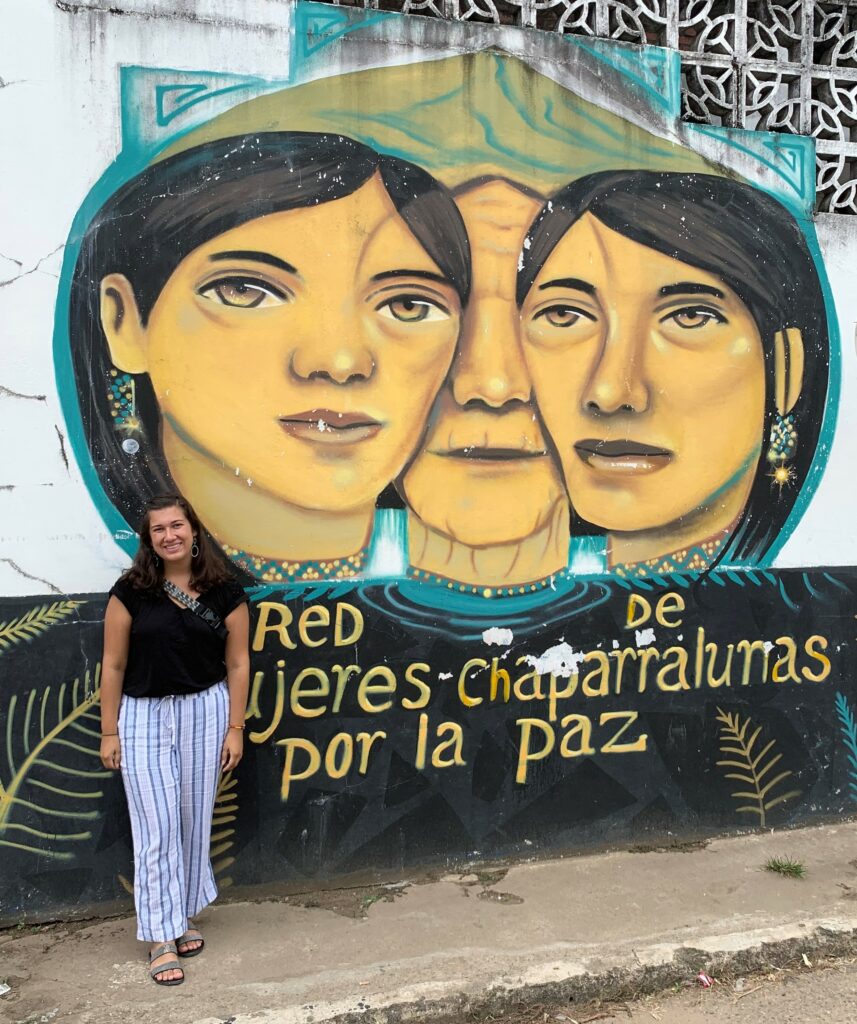
Michelle Rivera stands in front of the Chaparrals Women’s Network for Peace Office in 2019. (Photo courtesy Michelle Rivera)
My time in Colombia was a highlight. My family is Colombian and I hadn’t been to Colombia since I was a child, so being able to go back was such a treat.
I went two years after the peace agreement had been signed, but the country continues to experience a lot of turmoil and conflict. I had conversations with people who were forcibly displaced from their homes and went on to build peaceful communities. For me, that was mind blowing.
Our interviews and focus groups looked at how Colombians saw what violence and conflict did to people and their mental health. Many people had been traumatized and were experiencing vicarious trauma.
The experience allowed me to draw on my academic background and was very impactful because I was able to talk to people in my home country. I also was able to understand and ensure that we weren’t re-traumatizing them. I really believe that my background in mental health helped me see it through a different lens.
We had to think about: “How can I present this question so that it does not trigger a traumatic thought that could make this person spiral?” Because of that, it was a participant-led research methodology.
We presented what we wanted to learn but gave them space to tell us what they wanted. It gave them the opportunity to disclose as much or as little as they wanted without causing harm.
A lot of your background is in peacebuilding. What’s your experience in mental health and why did you decide to get more involved in it now? Was the decision to do humanitarian work a conscious one or did it occur naturally?
After going to graduate school and working in mental health, I wanted to incorporate mental health within my work on a more global scale.
That is why my studies concentrated in peacebuilding: I learned that peacebuilding was very much focused on people and on relationships, how people interact with each other, how they are different from each other. I saw a lot of links there and I really wanted to dive deeper into all my work in peacebuilding and mental health.
When I was working with students in foster care, it taught me to work with people who had been traumatized and hadn’t been taught with coping mechanisms and the skills support themselves emotionally.
Even though they were adults, I lived and worked at dorms with them so if there were any situations or conflicts, I was there to support them. My role was to ensure that they had a smooth transition and to mediate if they had issues with others.
I took those skills and transferred them into my graduate program and the positions I held after.
I always had in the back of my mind that whatever I did, I wanted it to be focused on mental health and ensuring that whatever I was doing was protecting people.
As for working mainly in humanitarian-focused organizations, I knew early on that I didn’t want to go into a “big corporate job.” I wanted to pursue a career where I was going to have interactions and conversations that I was passionate about.
I am a firm believer that we learn from the people that have experienced everything we’re trying to learn from.
I went into the humanitarian sector because it gave me the opportunity to learn from people on the ground and understand their lives. This was both a conscious decision, but it also came naturally because a lot of the opportunities within my concentration were in the humanitarian sector.
I learned that being at an organization where I really believe in the mission motivates me to continue working in the humanitarian sector.
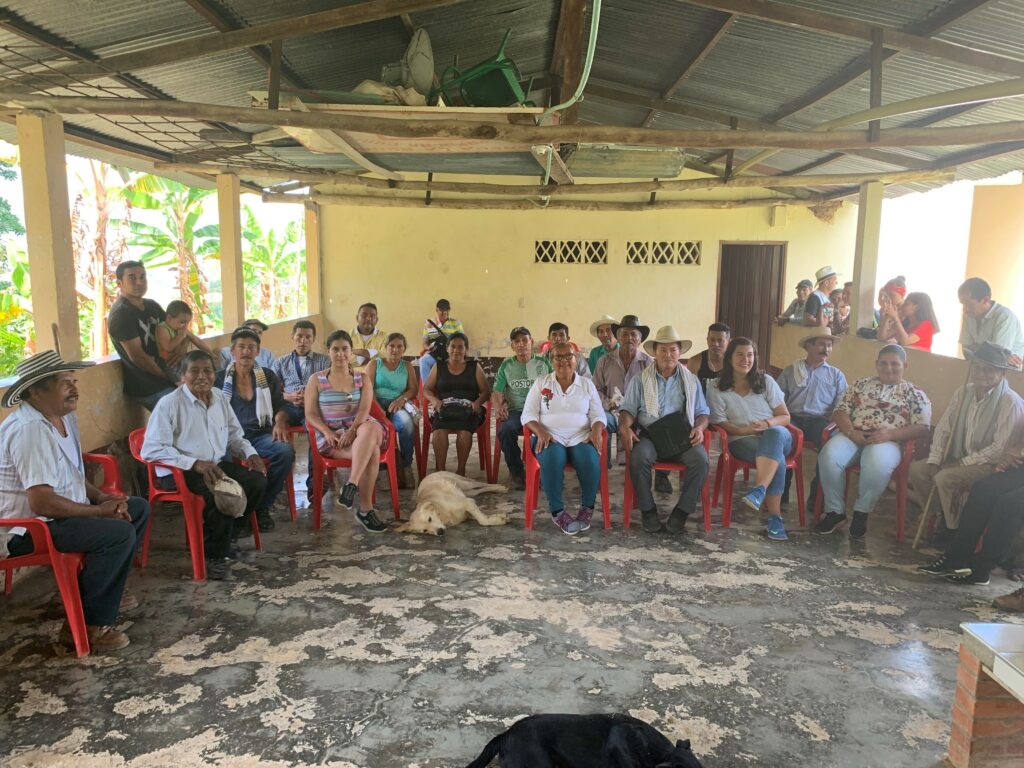
Michelle Rivera is pictured here with farmers from the peacebuilding focus group in La Sonrisa, Tolima, Colombia, in 2019. (Photo courtesy Michelle Rivera)
What led you to the Carter Center?
When I asked myself, “Where do I see myself working?” The Carter Center was one of the very few options that I thought was a good fit. And I followed The Carter Center’s work closely.
The more I saw what kind of events and programming they were doing, it confirmed this was a place where I really wanted to work. I was constantly on The Carter Center website looking for open positions.
I would definitely say this job is a dream come true. It was a hard position to get, but looking back, it all worked out with good timing.
You don’t have a background in journalism. What attracted you to the fellowships?
I knew how important reporting on mental health was and I saw where that there was—and still is—a huge need for people to be educated on mental health. We did see a surge in this need during COVID.
My thesis in grad school also helped solidify the importance of having solid articles written about mental health. That’s all I read when I was doing research and it felt like there was new data or new research coming out every day.
In April and May of last year, it felt like we were inundated with information on mental health and how people were coping with this new reality, and in a way it kind of helped me to learn how to navigate that new reality.
I knew it was important, but I didn’t know that there was a community of people committed to actively reporting on this. When I saw this position and that it supported journalists doing this work, it made me really excited because I knew that there’s such a need.
With your background in psychology and outreach, what’s your perspective on how the mental health community’s communication has been with the general population?
I think we’re at a turning point. Unless you were surrounded with people who were in mental health, mental health wasn’t really something we spoke about. And I think the Covid-19 pandemic just came and has been changing all of that.
People are finally seeing that mental health is just as important as physical health. They’re not as embarrassed to talk about it or they don’t see people as weak if they talk about mental health.
This is an ongoing conversation that we need to have as a society if we want to come out of this pandemic. I still think there’s more to do, and that’s why I’m excited that I get to support journalists doing the good work of reporting on this because reporting on this isn’t easy.
What do you hope to learn and what do you hope to give?
I’m excited to learn from an amazing group of people and their lifelong experiences in journalism and in mental health. I’m also excited to learn from the fellows, how they navigate this climate we’re living in and how they’re able to do their projects.
I’m excited about the project management side of the job where I am interacting with different departments and learning more about budgets and finance.
I’ve always been interested in how a larger organization like The Carter Center thrives. How does it stay reputable and credible to people in this community, and maintain transparency and relationships with donors?
Something I hope to bring is that I look at everything with a mental health lens, and I’m excited that I’m on a team that does that as well.
My background is unique in the sense that I’ve been able to work within mental health and experience what it looks like in communities that have been negatively impacted regarding their mental health. My experiences helped me give a good world view of what kind of the climate has been like within mental health and within vulnerable communities.
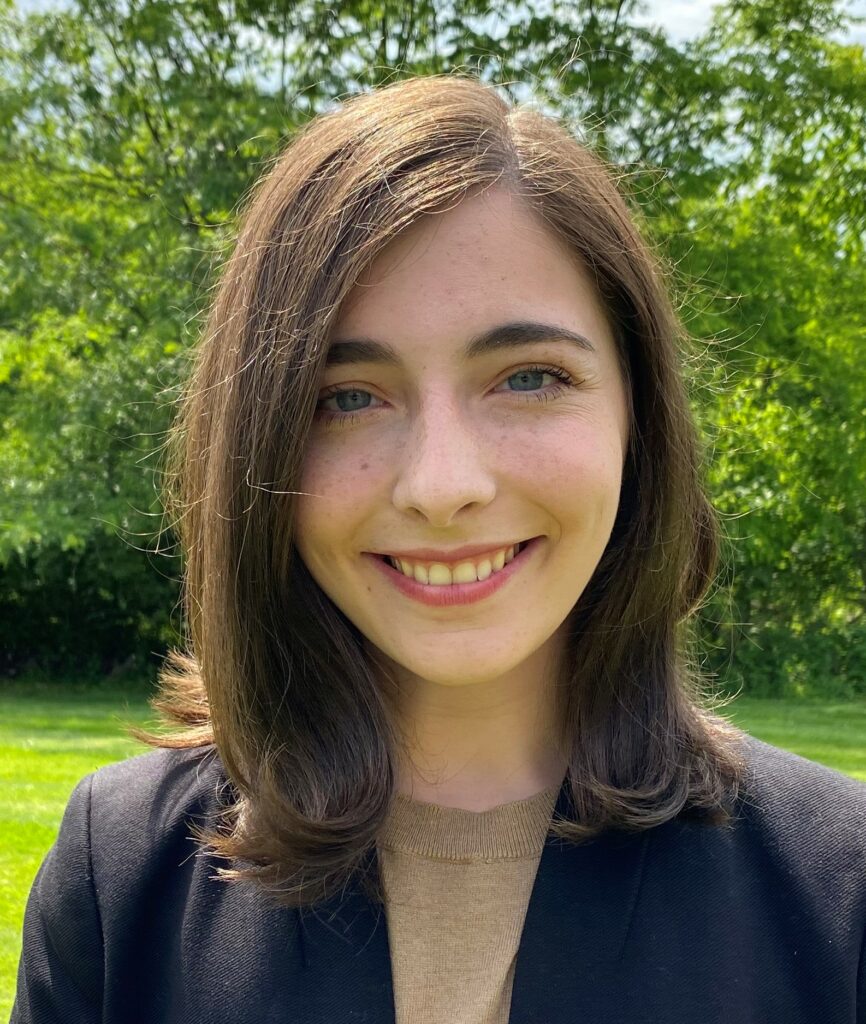
Sophia Rhoades
Sophia Rhoades is a graduate of the University of Tennessee Knoxville, with a degree in American Studies and minors in Political Science and Psychology. She advocated for improved mental health resources through UT Knoxville’s student government, helped increased funding and student oversight for the university’s counseling center, and created the Semicolon Project, an anti-suicide initiative. She is a Habitat for Humanity volunteer and served as president for the school’s Habitat for Humanity chapter.
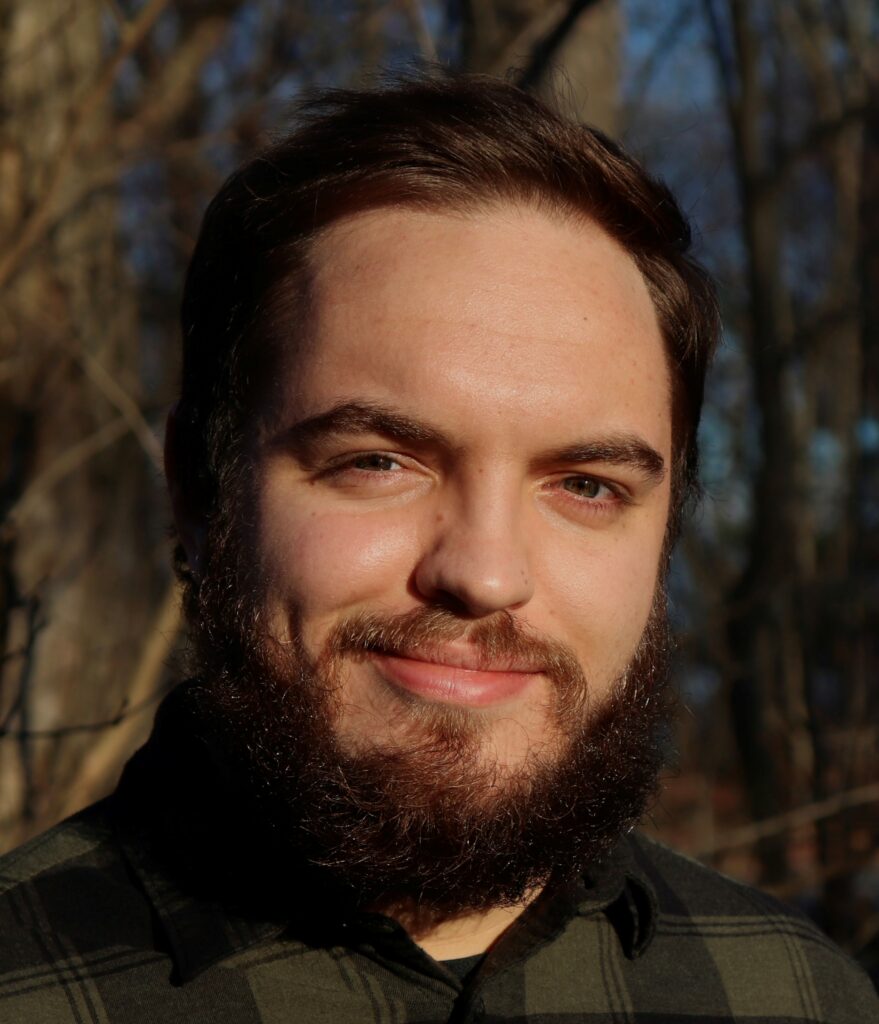
Matt Semon
Matthew Semon is a junior at Gettysburg College, where he majors in Psychology and minors in Middle Eastern and Islamic Studies and Peace and Justice Studies. Semon is a research assistant in the Developmental Psychology Lab on campus. In his spare time, he DJs at the college’s radio station and volunteers at a local community garden.

